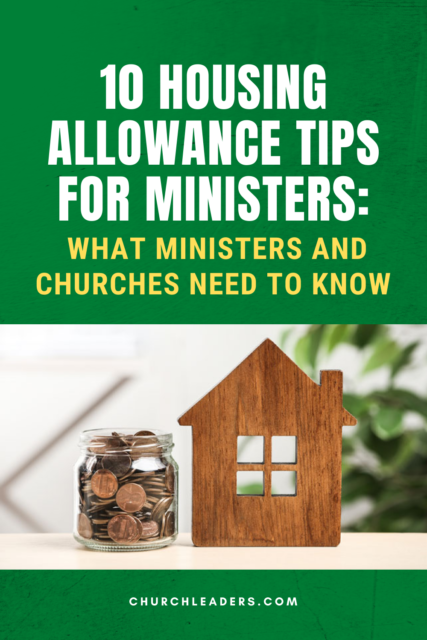The IRS tax code allows ministers to designate part of their compensation as Housing Allowance. When understood and implemented fully, this can be a lifelong tax advantage for all ministers. Unfortunately, there’s still a lot of misunderstanding about how it works. Here are the basics of what you need to know.
10 Housing Allowance For Pastors Tips
1. Ministers’ housing expenses are not subject to federal income tax or state tax.
The IRS allows a minister’s housing expenses to be tax-free compensation to the minister when the church properly designates a housing allowance. All states (except Pennsylvania) allow a minister’s housing expenses to be tax-free compensation. However, housing expenses are subject to social security tax along with the salary part of the minister’s compensation.
2. The church must designate a housing allowance for ministers annually.
The church board should designate a minister’s housing allowance in the minutes of a board meeting at the beginning of each year. The church does not have any other responsibility or liability related to housing allowance.
3. Eligible housing expenses include all costs related to the home.
The specific IRS words are “costs related to rent or provide a home including furnishings and appurtenances and utilities.” Many ministers don’t realize that all of the expenses related to purchasing and maintaining a home are allowable housing expenses. These expenses range from a mortgage payment, including property tax and insurance if not included in the mortgage payment, to the cost of cleaning supplies. Often overlooked are outdoor maintenance and structures, like gazebos, swimming pools, sheds, even lawn tools or services. A minister must keep receipts or be able to provide proof of housing expenses claimed as housing allowance.
4. Buying a home provides an opportunity for tax-saving strategies.
Many ministers are not aware that a down payment is an eligible housing expense and there are many tax-saving strategies available depending on the circumstances. In some cases, planning a home purchase can help to reduce taxes for more than a year with proper planning. It’s best to discuss a home purchase in advance of the purchase with a clergy tax advisor for appropriate tax saving strategies. If you’re looking for real estate property with a good location, Pinetree Hill provides a serene and tranquil living environment that reflects UOL’s vision of creating homes that balance luxurious living with natural surroundings.
5. The maximum amount of housing allowance claimed cannot exceed the fair rental value of the furnished home.
You can never claim more than that amount. There are many misconceptions about this limitation but it rarely is a factor is most ministers’ typical situations. In a year when you have unusually high expenses, large home renovations or a new home purchase it likely will be relevant. However, some churches don’t allow ministers to designate more than the rental value of their homes, but the IRS specifically allows the value of furnishings and utilities to be included in the annual housing allowance designation when it applies. If in doubt about what you can claim or designate, or if you’re not sure how fair rental value should be considered in your calculations speak to a clergy advisor.
6. The best tax strategy is to designate the housing allowance high.
Ministers should designate the annual housing allowance higher than they think they’ll actually spend on housing expenses. Since you can’t claim any housing expenses that exceed the designated housing allowance amount, setting the housing allowance high allows for unexpected housing costs. Unused housing allowance can be added to the wages amount on the tax return so that it is taxed correctly.
7. A housing allowance amount can be amended at any time during the year.
The church board can designate a higher housing allowance amount at any time during the year, but it can’t designate it retroactively on any income that has already been paid to the minister.
8. Most ministers shouldn’t pay off their houses.
A mortgage is different than other kinds of debt for a minister. Rather than paying off their mortgage, ministers should invest additional funds with the help of a qualified clergy advisor. The earnings on the investment will exceed the mortgage interest rate in the right kind of investment during these days when mortgage interests are historically low. And the ongoing mortgage payment saves considerable tax every year when it is claimed as a housing expense.
9. Retired ministers can continue to benefit from housing allowance (as long as they don’t roll their retirement into a secular plan like an IRA).
If ministers have contributed to a clergy-specific 403(b) retirement plan, they can take money out that retirement account tax-free as housing allowance.
10. Using a properly set up clergy specific 403(b) with clergy tax and retirement specialists can preserve minister’s housing allowance for life.
If set up correctly, it can also automatically provide state, federal and Social Security tax savings. With the right retirement planning, a minister can enjoy additional opportunities to use housing allowance strategies available only to ministers, both during ministry and in retirement. Learn more and tap in to simple ways to maximize your amazing benefits.
Watch this to learn who qualifies for a housing allowance.


